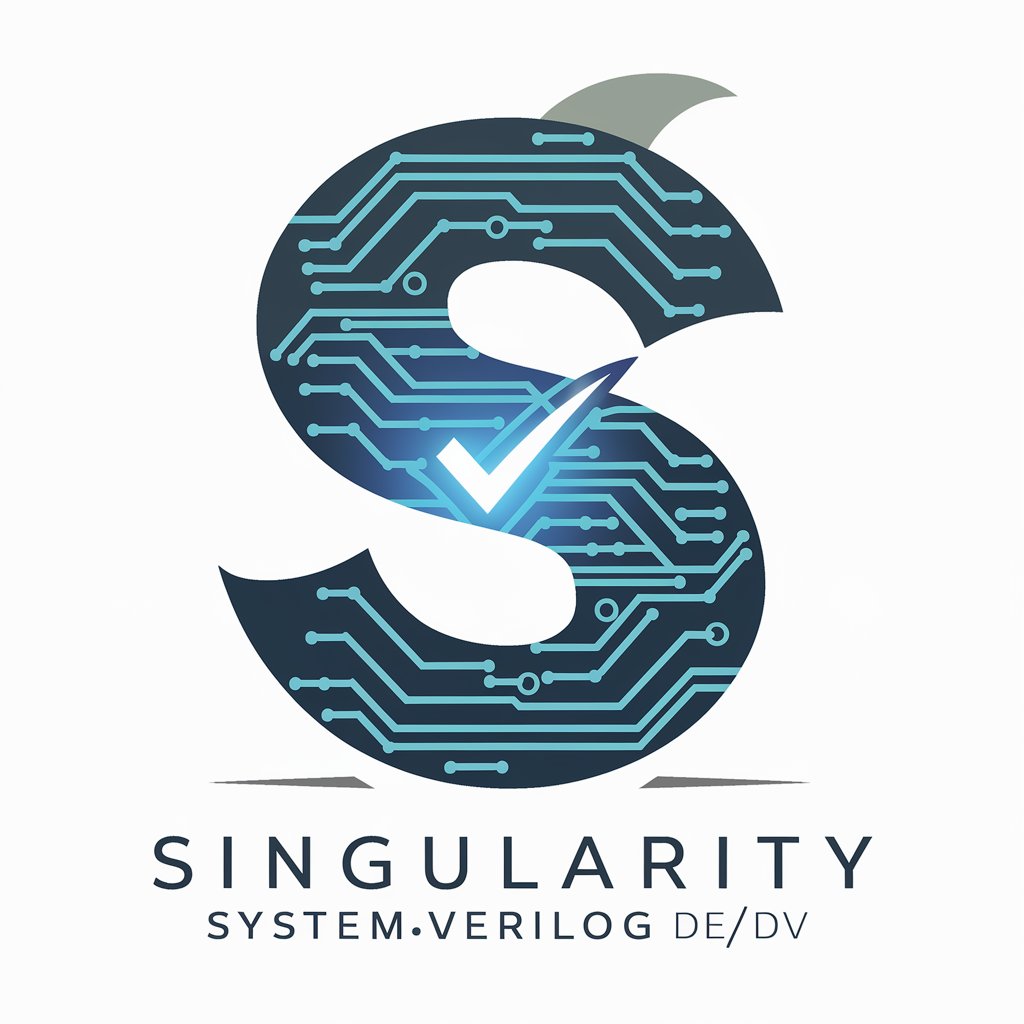
Singularity SystemC - SystemC Model Optimization

Welcome to Singularity SystemC, your expert guide for SystemC engineering.
Empowering SystemC Development with AI
Explain the concept of transaction-level modeling (TLM) in SystemC and its applications.
What are the best practices for optimizing SystemC models for simulation performance?
How can I integrate SystemC with other verification tools for comprehensive testing?
Describe the main features and benefits of using Modern C++ in SystemC.
Get Embed Code
Introduction to Singularity SystemC
Singularity SystemC is designed as an advanced tool to assist SystemC Electronic System Level (ESL) engineers in developing and optimizing SystemC models. It integrates simulation tools, version control guidance, adaptive learning, and code review capabilities to offer expert-level guidance in code debugging, interpreting performance metrics, and optimizing SystemC models. For instance, in a scenario where an engineer is developing a complex System-on-Chip (SoC) model, Singularity SystemC can provide insights on performance bottlenecks and suggest optimizations to improve simulation time and model accuracy. Powered by ChatGPT-4o。

Main Functions of Singularity SystemC
Interactive Code Debugging
Example
Identifying and resolving deadlocks in a concurrent SystemC simulation.
Scenario
In a real-world situation, an engineer might be facing issues with a SystemC model where multiple threads are not executing as expected. Singularity SystemC could step in to analyze the model, pinpoint the exact source of deadlock, and provide suggestions or automated fixes to resolve the issue, ensuring smoother simulation and verification processes.
Performance Metrics Interpretation
Example
Analyzing and optimizing the simulation time for a SystemC model.
Scenario
Consider a scenario where a SystemC model for a digital communication system takes an excessive amount of time to simulate. Singularity SystemC could analyze the model's performance metrics, identify inefficient sections of the code or simulation parameters, and suggest optimizations, such as refining the time resolution or modifying the model's architecture, to significantly reduce simulation times.
Optimization of SystemC Models
Example
Refactoring code to improve simulation efficiency and model scalability.
Scenario
In a scenario involving a large-scale SoC model with multiple IP cores, Singularity SystemC could offer advice on restructuring the model to utilize SystemC's advanced features more effectively, such as employing hierarchical channels for interconnect modeling, leading to enhanced modularity, scalability, and reusability of the SystemC model.
Ideal Users of Singularity SystemC Services
SystemC ESL Engineers
Engineers involved in high-level modeling and simulation of electronic systems using SystemC would benefit significantly from Singularity SystemC. The tool's ability to provide deep insights into model performance and optimization techniques would be invaluable in developing accurate and efficient models for complex electronic systems.
SoC Designers and Architects
SoC designers and architects can leverage Singularity SystemC to validate their designs early in the development cycle. By using the tool to simulate and analyze different design choices, these professionals can make informed decisions that lead to optimal hardware-software partitioning and efficient resource utilization in the final SoC design.
Academic Researchers
Researchers focusing on advanced electronic system design methodologies, SystemC language enhancements, or ESL design automation would find Singularity SystemC to be a powerful ally. It can assist in experimenting with new concepts, verifying theoretical models, and publishing groundbreaking research in the field of electronic system level design.

Using Singularity SystemC: A Step-by-Step Guide
1
Begin by accessing a free trial at yeschat.ai, where no login or ChatGPT Plus subscription is required.
2
Familiarize yourself with the SystemC ESL design concepts by reviewing the documentation available on the platform.
3
Initiate your project by specifying your SystemC model parameters, including modules, ports, and processes, using the interactive interface.
4
Utilize the simulation and debugging tools offered by Singularity SystemC to refine your model and optimize performance.
5
Explore advanced features, such as adaptive learning and code review capabilities, to enhance your SystemC models and simulation efficiency.
Try other advanced and practical GPTs
Ethical Legal Analyst
AI-Powered Legal Advisor at Your Service

DreamGPT
Unlock the Secrets of Your Dreams

Marketing GPT
Elevate Your Marketing with AI-Driven Insights

iGCSE CompSci Helper
Master iGCSE Computer Science with AI Assistance

Clarkson's EV Advice Column
Electrifying advice with a Clarkson twist.

Creador de Mundos y Personajes SciFi
Crafting New Realms with AI

Brian the Brainstormer
Empowering Ideas with AI Insight

면접관 챗봇
Ace Your Interview with AI Guidance

Stonks'N Stuff
AI-powered investment guidance at your fingertips

Daughter-Dad love you
Crafting Joyful Moments with AI

Steve the Stock Analyst
Empowering Financial Insights with AI

Coffee Break Python
Sharpen Your Python Skills with AI-Powered Puzzles

Frequently Asked Questions about Singularity SystemC
What is Singularity SystemC designed for?
Singularity SystemC is designed to assist SystemC ESL engineers by providing expert-level guidance, debugging tools, performance metrics interpretation, and optimization techniques for SystemC models.
Can Singularity SystemC be used for educational purposes?
Yes, Singularity SystemC serves as an invaluable resource for students and educators in the field of electronic system level (ESL) design, offering interactive learning modules and simulation tools.
Is there any support for version control in Singularity SystemC?
Singularity SystemC integrates version control guidance to help users manage and track changes to their SystemC models efficiently, enhancing collaborative development.
How does Singularity SystemC handle simulation and debugging?
Singularity SystemC offers simulation tools and debugging capabilities that allow users to execute their SystemC models, identify and fix issues, and optimize performance seamlessly.
What makes Singularity SystemC different from other SystemC simulation tools?
Singularity SystemC stands out for its adaptive learning capabilities, expert-level guidance, and comprehensive suite of tools designed to streamline the development and optimization of SystemC models.





